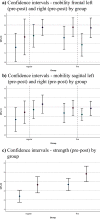Effects of combined exercises on shoulder mobility and strength of the upper extremities in breast cancer rehabilitation: a 3-week randomized controlled trial
- PMID: 37656241
- PMCID: PMC10474198
- DOI: 10.1007/s00520-023-07959-1
Effects of combined exercises on shoulder mobility and strength of the upper extremities in breast cancer rehabilitation: a 3-week randomized controlled trial
Abstract
Purpose: The aim of this study was to analyze the effects of mobility training with FIVE® devices in combination with device-supported strength exercises for shoulder mobility and strength of the upper extremities in women with breast cancer.
Methods: We conducted a pretest-posttest intervention study with female breast cancer patients (n = 41) who were randomly assigned to two groups by lot during their stationary follow-up treatment at a rehabilitation clinic in the south of Germany between February and March 2020. As part of exercise therapy, the intervention group (n = 24) performed a mobility training with FIVE® devices combined with device-supported strength training, whereas the control group (n = 17) completed device-supported strength training. Before and after the 3-week intervention (3 training sessions/week), shoulder mobility and isokinetic maximal strength were tested.
Results: Both groups achieved significant improvements in shoulder mobility in the frontal and sagittal plane (between 3.8 and 15.35%; p < 0.05) and in strength performance (31.36% [IG] vs. 51.24% [CG]; p < 0.001). However, no robust evidence could be determined about potential interaction effects.
Conclusion: A combined device-supported strength and mobility training (FIVE®) showed no advantages. Therefore, a variety of exercise methods is possible in exercise therapy of breast cancer patients.
Clinical trial registration number: Since the University of Education Weingarten does not assign clinical trial registration numbers or ethical approval numbers, none could be assigned for this study.
Keywords: Breast cancer rehabilitation; Exercise therapy; Mobility training; Physical activity; Strength training.
© 2023. The Author(s).
Conflict of interest statement
The authors declare no competing interests.
Figures



References
Publication types
MeSH terms
LinkOut - more resources
Full Text Sources
Medical
Research Materials

